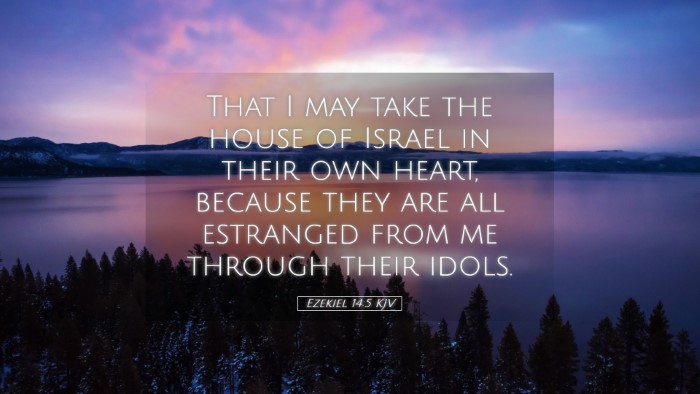Ezekiel 14:5 Commentary
In Ezekiel 14:5, we find a profound statement regarding God's judgment and the human heart's inclination towards idolatry. The verse reads:
"That I may take the house of Israel in their own heart, because they are all estranged from me through their idols."
Contextual Overview
This passage comes amidst a series of judgments pronounced by Ezekiel against Israel for their idolatrous practices. During this period, the nation was facing dire consequences due to their turning away from Yahweh, seeking ungodly alliances, and indulging in pagan worship. Analyzing the surrounding chapters reveals the depth of Israel's spiritual corruption and God's relentless pursuit of His people's hearts.
Theological Insights
The core of this passage speaks to God's desire for a genuine relationship with His people. A few key themes emerge:
- The Sovereignty of God: The phrase “that I may take” underscores God's active role in judgment. He has authority over the affairs of men and their hearts.
- The Condition of the Heart: The term “own heart” highlights that idolatry is fundamentally an issue of the heart rather than mere external actions. It is within the heart that the root of sin and rebellion lies.
- Idolatry and Estrangement: The word “estranged” suggests a severing of relationship. Israel's focus on idols created a chasm between them and God, showing that misplaced worship leads to spiritual and relational fallout.
Commentary Insights
Matthew Henry
Henry emphasizes the seriousness of idolatry and its implications. He notes that God's judgment reflects not only His justice but also His love for His people. By addressing their hearts, God is attempting to lead them back to himself, revealing that the ultimate purpose of judgment is to restore rather than to destroy.
Albert Barnes
Barnes elaborates that this verse illustrates God's desire for real transformation within the hearts of the people. He argues that until the heart is changed, external worship and rituals are meaningless. Barnes mirrors the sentiment that God seeks to purify Israel and draw them back into proper relationship, which can only occur through a radical change in allegiance from idols to Yahweh.
Adam Clarke
Clarke focuses on the metaphor of idols, suggesting they represent not just physical objects of worship but also any distractions that pull the heart away from God. He discusses the nature of human propensity towards idolatry, noting that people often create “gods” in their own image, which leads to spiritual blindness and estrangement from God.
Application for Today
The implications of Ezekiel 14:5 remain relevant for contemporary readers:
- Self-examination: Believers are encouraged to examine their own hearts for idols that may have taken precedence over their relationship with God.
- Understanding God's Character: God's willingness to confront idolatry signifies His commitment to holiness and love. This challenges believers to pursue holiness and genuine worship.
- Restoration through Repentance: The potential for restoration is always present. Repentance leads to reconciliation, echoing the truth that God desires to gather His people back to Himself.
Conclusion
Ezekiel 14:5 serves as a poignant reminder of God's desire to reclaim the hearts of His people. The commentary drawn from esteemed biblical scholars illustrates the depth of this verse as it relates to idolatry, judgment, and the nature of divine restoration. In an age where distractions abound, the call remains for believers to turn from false idols and redirect their hearts toward the living God.


